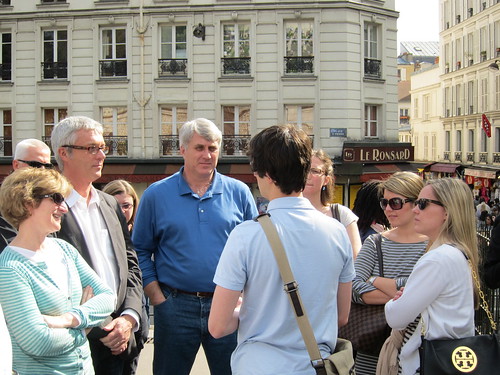Differences in Business Mentality

Throughout this book, one sees a common theme: a nation gets powerful as a result of good decisions, a strong economy, and success in war.
As a result of their success, many of these countries became over extended, had strewn their money and resources over far too large an area, and eventually were the cause of their own demise.
One might wonder what this has to do with the subjects that I normally discuss in my articles, but I’m getting there.
As I came across this theme in Kennedy’s book, I came to realize that this type of rise and fall could be applied to other fields as well.
Let me give the example of someone opening a restaurant in the United States. With good promotion, products, and/or success, the workload will most likely increase. This is a good thing, to a point. It becomes tempting to continue to expand operations, hire more employees, and try to make more money. Since the restaurant is successful, why not open a second one? Why not use the extra capital to expand into a totally different direction or industry? Occasionally this works out, though oftentimes it does not. Companies can get too spread out and pay less attention to small details. This may lead to less personal attention to clients, more stress, and an increasingly unpleasant work life.
A business mentality that could work?
In France, French chain restaurants are a rarity in comparison to the seemingly endless amount of restaurant chains in the United States. Most restaurant owners in France are in charge of one sole restaurant, or in rare occasions, two or three. When posed with the question: “Your business is doing so well. Why don’t you take advantage of it and open a second restaurant?” most would respond: “Why would I do that? I am already busy enough as it is.”
By keeping operations relatively small, the French are able to focus on the quality of their products. Occasionally this will lead to high prices, especially if a vendor is offering a product with high demand. Many French culinary delicacies are able to pull this off.
In Julia Child’s book, My Life in France, American experts made suggestions for the French on how they could ‘increase productivity and profits’ in their respective businesses. She suggests the following response to be what an average Frenchman might say:
“These notions of yours are all very fascinating, no doubt, but we have a nice little business here just as it is. Everybody has a decent living. Nobody has ulcers. I have time to work on my monograph about Balzac, and my foreman enjoys his espaliered pear trees. I think as a matter of fact, we do not wish to make these changes that you suggest.”
To comfort those that work far more than necessary, some complain that the French are lazy and don’t get much done. As a result of this misconception, the fact that France is one of the most productive countries in the world is a surprise to more than a few. A survey conducted by UBS, a banking and financial services group, found that French workers are on the job more than 300 hours less per year than the world average. When comparing GDP per capita and number of hours worked per year, it actually turns out that the French are more productive than the Americans (‘French: The Most Productive People in the World’, Business Insider, August 20, 2009).
Another difference in mentality is what one wants to achieve by working a full time job. Does one work to buy nicer things, or does one work just enough so that they can have plentiful time off? The differences in vacation time between the United States and France are well known, and yes, the differences are as staggering as reported.
The French have, on average, five to six weeks of vacation time per year. Americans have, on average, two. Furthermore, many choose not to take their full vacations, for they feel like they will appear lazy for taking more than a few days off a year. I know of many Americans who work constantly throughout their vacation, even though they are supposed to be off work. An American friend of mine was told that he would be reprimanded if he turned his work cell phone off, even at night while sleeping (I should add that he was supposedly on vacation). The puritanical work ethic has remained ingrained in our collective consciousness in the United States, whether we are aware of it or not.
Meanwhile in France, no work related anything gets done while on vacation. Bosses even tell their employees not to work while on holiday (not that they need the reminder). While on vacation, emails are left unanswered and phone calls are hardly acknowledged.
No one in France would think of giving up his or her vacation. A friend of mine who worked in Paris told me that in her office of 60 or 70 employees, only two of them were at work for the majority of the month of August. Not surprisingly, the ones that stayed were not French.
While some in the world would prefer to work to increase prestige, privilege, and productivity, others are content to work just enough to provide a comfortable living for themselves and/or their families, have ample time off from work to be with them, and have time to pursue other pleasurable activities. Who can say whether one way of viewing one’s career is the right or wrong way, but given the choice, I personally would choose the latter.
Do you think the french are lazy, or is their business mentality really that much better?
All images © John Paul Fortney








Thank you John-Paul.
French people are lucky to work in France… but when they have a job! Your subject is fitting given the coming election.
Your article is very interesting!
Au plaisir de vous lire.
Interesting! But what happens when a French person working abroad claims for their several weeks of vacation?…
Hi Julie!
That’s an interesting question. I guess it depends on whether they are working for a French company or not. But I imagine that in most cases they would get the same amount of vacation as others in that country.
Emmanuelle- I totally agree with you. The 6 weeks or so of vacation time is nice, if you have a job the other 46 weeks of the year! It is amazing how many people I know here that are not working at all or doing whatever little work they can find from day to day. They certainly are capable of having a nice job, though the opportunities are scarce right now. At least the chômage here is decent (at least by comparison to the United States).
Thank you for writing (and reading)!
Wonderful piece, John-Paul! Even after having lived in the U.S. for over 36 years, I still do not understand the “Puritan work ethic.” My boyfriend and I were on vacation along the Gulf Coast for a week in early January, and he spent a great deal of time checking his blackberry to see if there was any fire at work that he was supposed to quench. This was rather annoying (I am a university professor, so when I am on a semester break, I do not have to deal with too many such things, except for students e-mailing to convey their unhappiness about their final semester grade…).
Thanks for writing Elisabeth! One can hope that America will change its ways and realize that having a little more time off from work might actually make the workers more productive. However, until the economy recovers, I think it is possible that those with jobs will become more paranoid about losing their employment, and perhaps be willing to do more away from the office than in the past. I can’t say but it’ll be interesting to see if the American work mentality changes in the coming years.
In any case, I am glad that you understand my arguments (and I’m happy that you are able to enjoy a decent amount of time off from work)!
Thank you John-Paul. I see what you mean. I was wondering if a French person used to the French mentality can still live happily in a ‘puritan work ethic’ country. Let alone the amount of vacation, I wonder how a French person is going to feel when their boss puts pressure – that they’re not expecting – on them, during weekends or whatever days off, say.
Hi Julie,
I see what you are asking. I’m not really sure how someone French would feel coming to work in a country like the U.S., but I imagine that it would be a big change from what they know in France.
If there is anyone French working in this kind of environment, I would love to hear your opinions and thoughts!
Excellent points, John-Paul. Julia Child’s quote is gold, and so is the reference to that surprising finding by “Business Insider”. You did a great job describing how attitudes toward business are shaped by different takes on life in general.
Less obviously, the relationship to money is also an interesting path to explore. I am translating a book by Jean-Pierre Ledauphin, where he addresses this specific point: http://frenchbook.wordpress.com/2011/12/31/the-french-mind-for-business/
Again, thanks for a great post!